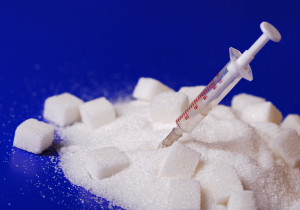Have you been diagnosed with type 2 diabetes?
Wondering how you can lower your blood sugar level naturally?

Well there are a number of alternative and lifestyle approaches to treating type 2 diabetes. Here I discuss what works based on the latest research.
Type 2 diabetes is a disease that responds well to lifestyle changes.
There’s room for medications and, in some cases, insulin, but there’s a lot you can do independent of drugs to control your blood sugar level – but what changes are most effective?
A study in the Journal of Family Practice looked at alternative therapies for treating type 2 diabetes – which ones work the best. Here’s what they found:
Which Diet is best for Type 2 Diabetes Sufferers?
The real question is what diet is most effective for blood sugar control?
Researchers in this study used hemoglobin A1C levels, a marker for glucose control over the prior three months to compare diets.
Three types of diets proved to be effective for lowering hemoglobin A1C (HbA1C).
The best was a vegetarian diet that emphasized whole fruits and vegetables. Not only did this diet lower hemoglobin A1C by 1.23 points, participants lost weight, another positive for glucose control.
Second in line from a dietary standpoint was a Mediterranean diet.
The Mediterranean diet emphasizes whole grains, fruits, vegetables, fish and healthy sources of fats like the monounsaturated fats in nuts and olive oil.
The Mediterranean diet de-emphasizes red meat and is low in saturated fat.
This type of diet was linked with reductions in HbA1C of 0.1 to 0.6 points. This type of diet plan seems to be particularly effective for reducing insulin resistance, a common problem in people with type 2 diabetes.
Finally, a low-glycemic diet lowered HbA1C levels by as much as 0.5 points. A low-glycemic diet de-emphasizes rapidly-absorbed carbohydrates like processed carbs and foods made with white flour, white rice and potatoes.
The goal is to replace them with slowly-absorbed carbs that are unprocessed and rich in fibre like vegetables and modest amounts of whole grains. Based on this research, this diet also increased HDL-cholesterol, the healthy kind that’s linked with a lower risk for heart disease.
What about Exercise?
As you might expect, exercise improves blood sugar control. Exercising at least 150 minutes a week drops HbA1C levels by as much as 0.89. Lesser amounts of physical activity also reduces HbA1C but more modestly.
Interestingly, both aerobic and resistance exercise lowers HbA1C levels with aerobic exercise being slightly more beneficial for controlling blood sugar. This isn’t surprising since exercise improves insulin sensitivity and shuttles glucose into cells independently of insulin.
Supplements
Three supplements proved to be effective for blood sugar control based on this study.
Supplementing with chromium, one of the trace minerals everybody needs, it’s involved in glucose metabolism (works with insulin production), lowered HbA1C levels by 0.6 which is almost as much as eating a low-glycemic diet.
If you are lacking in chromium then your insulin production will be out of balance causing too much glucose to remain in your bloodstream. As we age, we tend to have a higher risk of developing a chromium deficiency.
Vitamin E supplements also lowered HbA1C levels but there’s some question about the safety of supplementing with vitamin E since one study linked it with a higher risk of all-cause mortality.
Magnesium modestly reduced HbA1C as well, although only about 0.3 points.
Other Alternative Therapies
Surprisingly, both biofeedback and meditation lowered HbA1C levels by between 0.5 and 0.6 points, although other mind-body therapies including yoga, Tai Chi, reflexology and massage didn’t have significant benefits.
Why does biofeedback and meditation help with glucose control?
Possibly because it alleviates stress.
Stress increases levels of a stress hormone called cortisol that can elevate blood sugar. Although it wasn’t studied, not getting enough sleep also elevates cortisol levels and can make it harder to control your blood sugar.
Finally, if you’re overweight, losing as little as 10% of your bodyweight can reduce HbA1C by 0.6 points. If you’re over your ideal body weight, losing weight is one of the best things you can do for your blood sugars and overall health.
The Bottom Line?
There’s plenty you can do from a lifestyle point of view to enhance your blood sugar levels.
May I suggest you focus on some of these lifestyle changing tips:
Eat more low-glycemic fruits and vegetables, exercise at least 150 minutes a week and lose weight. Use meditation to relax and relieve stress. Supplementing with chromium and magnesium may also be of benefit, but don’t do this without consulting your doctor.
In fact, never take any over-the-counter supplements without consulting your family doctor first.
Regardless of whether you use medications or insulin to control your blood sugar, these lifestyle changes can improve your blood sugar control and your health.
References:
The Journal of Family Practice. July 2013. Vol. 62. No.7. Int J Vitam Nutr Res. 2004 May;74(3):178-82.
Leave a Reply